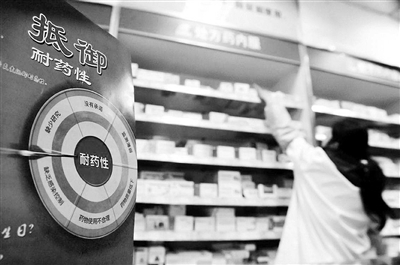Release date: 2017-04-27
Every year, about 700,000 people worldwide die from “superbug†infections, and 230,000 newborns die. The number of deaths in 2050 may exceed 10 million... A set of data disclosed by the World Health Organization is shocking, and antibiotic abuse is the culprit. .
The United States recently announced a case that showed that a female patient was resistant to 26 antibiotics after being infected with the bacteria, which made the hospital helpless. 
WHO publishes list of super bacteria
For the first time, the World Health Organization has released 12 lists of super bacteria listed as the highest priority. These super bacteria are classified into three categories according to their risk level: emergency, high attention and moderate. It is known that the priority classification of the 12 super bacteria announced this time is based on the following considerations: drug resistance in the clinic, mortality caused by drug resistance, the frequency of infections, and the infections brought to the health care system. The burden of coming.
This is not the first warning from WHO that the organization has stated in several previous reports that if many stakeholders do not take urgent measures, then the world will move towards a “post-antibiotic eraâ€, a common infection that can be cured for decades and a slight The damage may be dead again.
According to the literature, the incidence of drug-resistant infections continues to rise worldwide, with up to 700,000 people dying from drug-resistant infections every year. The main cause of drug resistance is the abuse of antibiotics, including human own treatment abuse and excessive use of antibiotics in animals. According to statistics, between 2000 and 2014, the standard dose of antibiotics has increased by 50%.
A study published by the World Bank in 2016 pointed out that if countries around the world do not take urgent action on issues such as antibiotic abuse, by 2050, the so-called superbug will cause one patient to die every 3 seconds. According to the report, according to current trends, by 2050, 10 million people worldwide will die from drug-resistant infections, and medical expenses for drug-resistant infections will account for 1.1%-3.8% of the world's GDP.
In response, the World Health Organization said that the list of "most dangerous bacteria" will be submitted to the G20 summit in Germany this summer to urge governments to pay attention to and effectively address the problem of drug-resistant bacteria.
The right medicine is the key
In many people's growing memories, fever and antibiotics are an unbreakable truth, and now more patients are asking for direct infusion.
Tsinghua Chang Gung Hospital Puneke Ma Xuzhu Deputy Chief Physician said in an interview with the Science and Technology Daily reporter that patients in the clinic often encounter a request for a fever patient: Please give me a direct infusion, or open a better and more advanced medicine.
In the patient's mind, infusion is faster than taking medicine, and more advanced medicines are often: newer, more expensive, and more broad-spectrum – more types of bacteria can be killed. In Ma Xuzhu's view, there is no high-level, low-level antibacterial drug at all. "Every antibiotic has its own characteristics, and the key is due to illness and choice." Ma Xuzhu explained that, for example, the old antibiotic nitrofurantoin is very cheap, but the treatment of community-acquired urinary tract infections is often better than those of the so-called advanced third-generation cephalosporins.
"The principle of antibiotic use is that you can use a narrow spectrum without a broad spectrum. If you can use a low grade, you don't need to use advanced ones. If you can solve a problem, you don't need several combinations." Ma Xuzhu stressed that it is a good medicine. The only criterion is that it can cure the disease. The right medicine is the key. "As a doctor, we will give patients correct and reasonable guidance according to the condition. When the patient feels the true heart of the doctor, they will cooperate very well. This is very prominent in our hospital."
Use antibiotics to avoid "two extremes"
For ordinary people, it is necessary to know that "three is not equal", that is, "antibacterial anti-inflammatory", in addition to bacteria, inflammation can also be caused by viruses, inflammatory factors, etc.; "fever" infection, there are many reasons for fever, such as Immunization, tumors, etc.; "infected with bacterial infections", the scope of infection is broader, including parasitic infections.
Need to be reminded that the use of antibiotics should also avoid "two extremes": over-application and long-term use. Doctors often have access to two types of people. One type of person is a little cold and coughing to take antibiotics. In fact, most of the colds are infected by viruses. It is basically useless to use antibiotics to deal with colds. Only when the cold person has yellow snot, jaundice, severe sore throat, tonsil swelling and pus, and otitis media, bronchitis, tonsillitis, nephritis, rheumatism and pneumonia, and confirmed by hemolytic streptococcus infection It is only necessary to treat with the corresponding antibiotics.
The other type of person is just the opposite. If you are sick, you don't take medicine and refuse treatment. The compliance of such patients is relatively poor, and there are often phenomena of insufficient medication and unauthorized withdrawal. In this regard, Ma Xuzhu stressed that patients must take antibiotics according to doctor's advice and medication. If antibiotics are used, if the drug is relieved because of the disease, it may cause the disease to recur and induce bacterial resistance, and the consequences will be more serious. In short, the common people who encounter the problem of using antibiotics must consult a doctor in time, and do not blindly abuse.
Source: Technology Daily
Xylo-Oligosaccharide 35 Powder
Xylooligosaccharide Feeds,Benefits Xylooligosaccharide Powder,Xos Xylo-Oligosaccharides
Qingdao Bailong Huichuang Bio-tech Co., Ltd. , https://www.qdblcycn.com